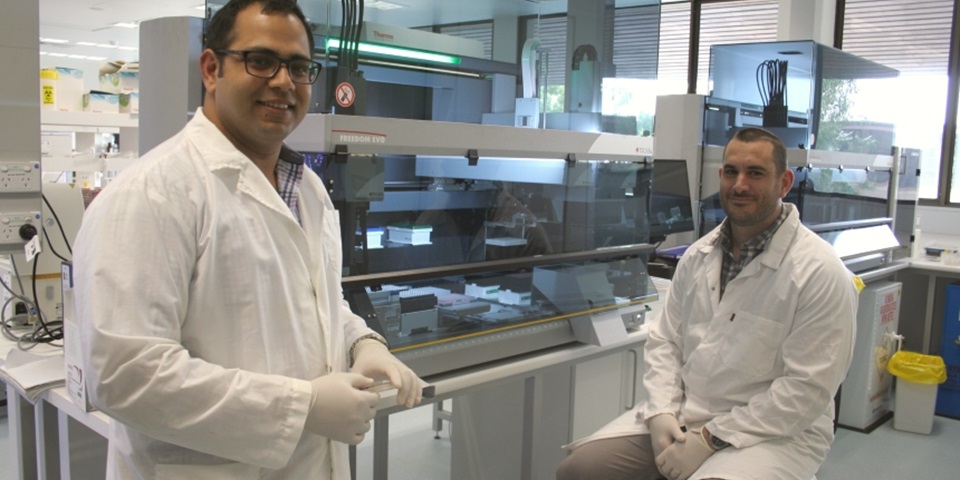News
Murdoch researchers exploring novel cures for COVID-19

A second major research initiative has been launched at Murdoch University to discover new points of vulnerability in the COVID-19 disease to develop new treatments.
Murdoch's Dr Mark O’Dea and Dr Sam Abraham are leading the research out of Murdoch’s Antimicrobial Resistance and Infectious Diseases Research Laboratory.
“Our discovery campaign is aimed at replenishing our depleted antiviral arsenal against SARS coronavirus 2 – the causative agent of COVID-19 – and other oncoming viruses which will undoubtedly jump species,” Dr O’Dea said.“The research will identify known drugs currently used for other purposes that can be rapidly redeployed for use in the current pandemic, “lost” antibiotics that are known to have antiviral activity but were never pursued commercially, and new antiviral candidates for the future.”
To assess each chemical candidate, the pair will utilise a betacoronavirus that causes the common cold as a surrogate for COVID-19 – which is also a betacoronavirus – to screen a library of 50,000 chemical compounds.
“We’re using nature as our inspiration with a focus on microbial chemicals,” Dr Abraham said.
In order to survive and prosper, microbes have waged ceaseless wars against ever-evolving viruses, called bacteriophages, by developing libraries of chemical defences. These provide a huge untapped source of antivirals.”Chemicals that show promise against the betacoronavirus will be rapidly advanced to screening against COVID-19 and then to animal models of COVID-19, before testing human suitability. The project will also identify new chemicals with applications against other virus species.
“This virus, like the coronaviruses causing the SARS and MERS outbreaks, continues a pattern of animal-borne viruses making the jump to humans, more often than not as a result of environmental encroachment and wildlife mismanagement by humans,” said Dr O’Dea.
“This pattern is highly likely to repeat in the future, so looking only within our existing human antivirals overlooks a rich source of unexplored chemistry that we have access to in this project.”The chemical compound and metabolite libraries being explored are made by Australian biotech companies who have collaborative links to Murdoch University including Neoculi, Microbial Screening Technologies and Epichem.
Dr O’Dea is a classical and molecular virologist who has been studying viruses for more than 15 years, and specifically viruses of bats, including coronaviruses, for five years. Dr Abraham has expertise in drug discovery and medicinal chemistry and working with hazardous organisms requiring strict containment.
This new research will run alongside the major COVID-19 research and diagnostics project being undertaken at Murdoch University’s Australian National Phenome Centre (ANPC).
Murdoch’s research into COVID-19 is a continuation of the University’s mission to change lives and solve problems of global significance.
About the Antimicrobial Resistance and Infectious Diseases Research Laboratory
The Antimicrobial Resistance and Infectious Diseases (AMRID) Research Laboratory is a $3.5 million One Health research and antimicrobial resistance surveillance facility.It has a suite of state-of-the-art molecular and non-molecular technologies, including high throughput genome sequencing, next generation robotics platforms for drug discovery and antimicrobial resistance research, and MALDI-TOF mass spectrometry for rapid identification of human and animal pathogens.
It is the only reference laboratory in Australia carrying out disease surveillance that covers the emergence of antimicrobial resistance in both humans and animals.